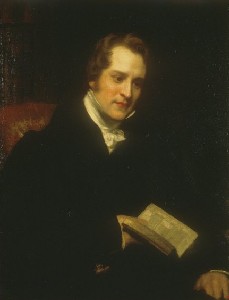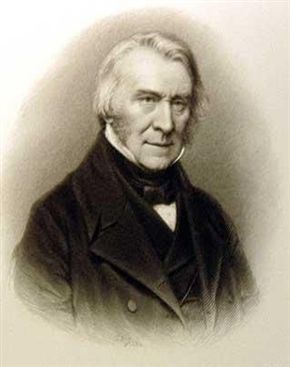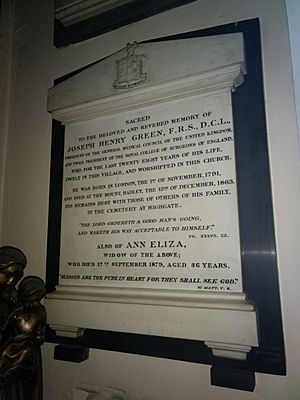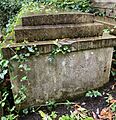Joseph Henry Green facts for kids

Joseph Henry Green (born November 1, 1791 – died December 13, 1863) was an important English surgeon. He is also known for being the person who looked after the writings of the famous poet Samuel Taylor Coleridge after Coleridge passed away.
Contents
Joseph Henry Green: A Life of Learning and Medicine
Early Life and Education
Joseph Henry Green was born in London on November 1, 1791. His father, Joseph Green, was a successful merchant. His mother, Frances Cline, was the sister of a well-known surgeon, Henry Cline.
When Joseph was fifteen, he traveled to Germany. He studied there for three years, with his mother by his side. After returning, he became an apprentice to his uncle, Henry Cline, at the College of Surgeons. He also trained at St. Thomas's Hospital.
In 1813, while still a student, he married Anne Eliza Hammond. Her father was also a surgeon.
A Growing Medical Career
On December 1, 1815, Joseph Henry Green received his diploma from the College of Surgeons. He then started his own surgical practice in Lincoln's Inn Fields in London.
In 1813, he became an unpaid demonstrator of anatomy at St. Thomas's Hospital. In 1817, he went to Berlin again. This time, he studied philosophy with Karl Wilhelm Ferdinand Solger. He had already met the poet Samuel Taylor Coleridge in London.
In 1820, Green became a surgeon at St. Thomas's Hospital. He was also made a professor of anatomy at the College of Surgeons in 1824. There, he gave many lectures on comparative anatomy. In 1825, he became a Fellow of the Royal Society. That same year, he also taught anatomy at the Royal Academy. He showed how anatomy connects to fine arts. He stopped teaching at the Royal Academy in 1852.
Green also taught surgery at St. Thomas's Hospital with Sir Astley Cooper. When King's College was founded in 1830, Green became the head of surgery there. He was especially known for a surgery called lithotomy.
Friend of a Famous Poet
Joseph Henry Green met Samuel Taylor Coleridge in June 1817. They became very close friends. Green spent a lot of time talking with Coleridge. Coleridge even included two of Green's poems in his own Poetical Works.
Coleridge trusted Green so much that he named him his literary executor. This meant Green was in charge of Coleridge's writings and books after his death. Green was asked to buy many of Coleridge's books. These books had notes written by Coleridge. Green bought them to help him publish Coleridge's ideas on philosophy.
In 1834, the same year Coleridge died, Green's father also passed away. Green inherited a large amount of money. He then took on the task of organizing Coleridge's works very seriously.
In 1836, he stopped his private medical practice. He moved to Mount House near Barnet. This house is now Mount House School. He also left his teaching job at King's College in 1837. However, he continued to work as a surgeon at St. Thomas's Hospital until 1852.
Green spent many years trying to put together Coleridge's philosophical ideas. He studied Greek, learned Hebrew, and worked on Sanskrit to help him understand Coleridge's thoughts better.
Later Achievements and Final Years
In 1835, Green was chosen to be a lifelong member of the College of Surgeons council. He became a member of the court of examiners in 1846. He was also the president of the college twice, from 1849–50 and 1858–59.
In 1851, he helped as a judge at "The Great Exhibition." He judged surgical tools and equipment. In 1853, he received an honorary degree from Oxford University.
When the General Medical Council was created in 1858, Green represented the College of Surgeons on it. Two years later, he became the president of the council. He held this important position until he died.
Joseph Henry Green suffered from inherited gout in his later years. He became very ill on November 1, 1863, and passed away at his home in Hadley on December 13. His friend, Sir John Simon, said Green's last words were "Stopped," referring to his own pulse.
He was buried in a family vault at Highgate Cemetery. He did not have any children.
Published Works and Reforms
Before 1820, Green published a book called 'Outlines of a Course of Dissections'. In 1820, he made it bigger and called it 'Dissector's Manual'. This book was one of the first of its kind.
He also published lectures and medical cases, mainly in The Lancet. In 1832, he gave a speech about the roles of doctors, lawyers, and religious leaders, based on Coleridge's ideas.
Green was a strong supporter of reforms at the College of Surgeons. He wrote pamphlets about medical education and reform. His ideas helped change the college's rules in 1843.
In 1841 and 1847, he gave important speeches at the college. He tried to connect science with Coleridge's philosophy in these talks.
Before he died, Green put together a major work from Coleridge's notes and teachings. It was called 'Spiritual Philosophy, founded on the teaching of S. T. Coleridge'. This two-volume work was published in 1865 by his friend Sir John Simon. The first part of the book was even dictated to Green by Coleridge himself.
Images for kids
 | DeHart Hubbard |
 | Wilma Rudolph |
 | Jesse Owens |
 | Jackie Joyner-Kersee |
 | Major Taylor |




